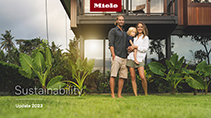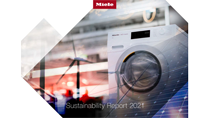Press releases
Miele: Sustainability and convenience united

-
Innovative solutions bring seeming opposites together
-
New Miele Sustainability Report: Usage phase offers greatest leverage in reducing environmental impact
Energy-efficient, innovative domestic appliances make a key contribution towards greater sustainability in homes. Consequently, Miele strives to continue to increase energy efficiency across all product groups. The sustainability report published today illustrates just how well Miele has succeeded in doing this. For example, 99% of all washing machines achieve the top A+++ energy efficiency rating, even overperforming by as much as 50%.
With its 2019 Sustainability Report, the Gütersloh family company is providing detailed insights into its understanding of what sustainable corporate guidance is – taking on board environmental aspects along with a sense of responsibility towards employees, topics relating to the supply chain, through to involvement in society. This publication outlines 15 overarching strategic sustainability targets, from Miele's environmental performance and stakeholder dialogue tailored to individual target audiences through to consumer-friendly digitalisation.
At all times, the products manufactured by the family-owned company are centre-stage. And it is not only the figures for laundry care which are so compelling. By way of an example, the new dishwashers from the G 6000 EcoFlex series surpass the required value for a top A+++ energy efficiency rating by between 10% and 20%. In late 2017, Miele received the coveted German Federal Eco Design Award for these models and their excellent energy efficiency, which is achieved through the use of an integrated heat storage system. In the commercial sector, Miele launched the Performance Plus model range during the period under review. These heavy-duty washing machines use around 20% less water and 30% less energy than their predecessors. This is achieved through a specially developed technical design in combination with a new wash process.
Innovations such as these promote advances in an area in which there is increasingly less room for further energy efficiency improvements. Furthermore, the desire for greater efficiency and sustainability is often at odds with increasing demands for performance and convenience. SingleWash is an intelligent solution which shows how conflicting demands in the home can be resolved. This wash cycle is Miele's response to a well-known phenomenon: In everyday use, washing machines are often run with only very small loads, a practice which costs unnecessary resources. With SingleWash, water consumption is precisely tailored to greatly reduced load volumes. This also automatically results in lower energy consumption. This way, Miele succeeds in combining sustainability with convenience.
Just how significant reductions in consumption during the usage phase are becomes immediately apparent when one considers how many hours and years washing machines, dishwashers, refrigerators and the like are in operation. More than three-quarters of total energy consumption for a domestic appliance from product engineering through to disposal are attributable to the usage phase at the point of installation.
So what impact does this have on the environment? To provide an answer to this question, Miele undertook a sample calculation during the reporting period to ascertain to what extent emissions are caused by direct electricity consumption during the use of Miele appliances. The outcome: In the usage phase of domestic appliances, emissions of several millions tonnes of CO2 accrued. By comparison, emissions at production plants, although not negligible, are considerably lower. Use in domestic households therefore offers the greatest opportunities to improve efficiency – all the more so if the above-average life expectancy of Miele appliances is factored into the equation. As a result, a reduction in consumption will continue to be at the focus of Miele's climate strategy. In future, emissions during use will also be included in the company's climate balance.
The goal of corporate climate policy is clear: Miele supports the two-degree target of international climate politics, and aims to be carbon-neutral by 2050 at the latest. To this end, the aim is to continue to increase energy efficiency in production and reduce specific energy consumption. Miele's 12 production plants are already pursuing their own schemes which subscribe to the overriding goals of Miele's sustainability strategy. These also include projects to promote a circular economy. The company has therefore instigated various measures to reuse materials from old Miele machines, for example in the form of cast-iron counterweights or as granulates for plastic parts.
With the 2019 Sustainability Report, Miele for the first time makes reference to the United Nations' Sustainable Development Goals (SDGs). The reporting period comprises the two business years 2016/17 and 2017/18. As in the case of past reports, this issue again follows the guidelines of the Global Reporting Initiative (GRI). The report is available for downloading only in German and English using the following link: www.miele.com/sustainability.
Go here to Sustainability Report 2019
Company profile: Miele is the world's leading manufacturer of premium domestic appliances including cooking, baking and steam-cooking appliances, refrigeration products, coffee makers, dishwashers and laundry and floor care products. This line-up is augmented by dishwashers, washer-extractors and tumble dryers for commercial use as well as washer-disinfectors and sterilisers for use in medical and laboratory applications (Miele Professional). The Miele company, founded in 1899, has eight production plants in Germany as well as one plant each in Austria, the Czech Republic, China and Romania. These are joined by the two plants belonging to Miele's Italian medical technology subsidiary Steelco. 2017/18 turnover amounted to approx. EUR 4.1 bn with sales outside Germany accounting for 70%. Miele is represented with its own sales subsidiaries and via importers in almost 100 countries. Throughout the world, the family-run enterprise, now in its fourth generation, employs a workforce of around 20,100, whereof 11,200 are employed in Germany. The company headquarters are located in Gütersloh/Westphalia, Germany.
Download as PDF Download incl. media (zip)
Ursula Wilms
+ 49 5241 89-1958
ursula.wilms@miele.com
Media information
| Description | Download |
|---|---|

Miele publishes its 2019 Sustainability Report: www.miele.com/sustainability. |
|
| High Resolution JPG |


